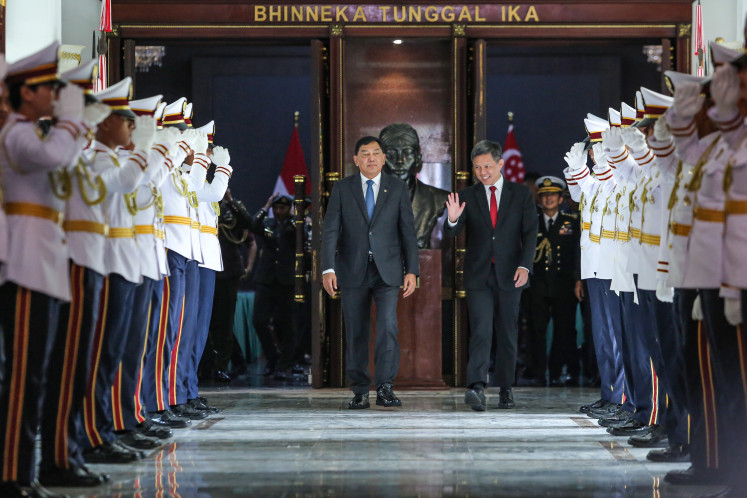Popular Reads
Top Results
Can't find what you're looking for?
View all search resultsPopular Reads
Top Results
Can't find what you're looking for?
View all search resultsYouth Pledge and entrepreneurship
On Oct
Change text size
Gift Premium Articles
to Anyone
O
n Oct. 28, 1928, young people from all over Indonesia made the Youth Pledge, affirming a single homeland, nation and language for the people of the then Dutch East Indies.
It is unfortunate that ahead of this year’s commemoration of the Youth Pledge, people read of student brawls, such as the one between students at SMA 70 and SMA 6 high schools in the Blok M area of South Jakarta, among other incidents.
The brawls have clearly distorted the image and ideals of the Youth Pledge. The key to figuring out such a repeated crisis among our young people is to best prepare them for future challenges and opportunities.
One of the major responses to this ever-challenging world must be to instill a strong sense of entrepreneurship in the country’s youngsters.
Entrepreneurship can play a pivotal role in spurring the youths’ self-reliance. It is good to know that countless young people are on top in various areas, such as business, ICT, education, energy and entertainment.
Despite their young age, those young people have become a source of inspiration for many other youngsters in this country.
This is particularly true as their attainment of wealth or fame has been closely bound to their own work instead of reliance on their parents’ fortune and celebrity. Hendy Setiono, the owner of Turkish kebab outlet Baba Rafi; Sandiaga Uno, the founding partner of the Saratoga Group; and motivational speakers Nanang Qosim Yusuf and Billy Boen, to mention just a few, are noted young figures who have stood on their own two feet at a young age.
Having grown their businesses, the entrepreneurs impart confidence to other young people. This is entirely contrary to those who inherited their parents’ fortune or grew their business owing to short-cut approaches such as corruption, collusion and nepotism.
Entrepreneurship has also been instrumental in developing young people’s bargaining power, which greatly serves to make them immune to pressure from vested interests and to set the scene for further expansion and networking. The latter has been clearly seen, for example, in the epic experience of Basrizal Koto — a local billionaire and the CEO of the Basko Group in West Sumatra – when he won a court battle against Caltex Pacific Indonesia (CPI) for harassment when he was young. Nobody else dared to fight against a powerful multinational company under Soeharto, but Basrizal did.
Promoting entrepreneurship will lead to increasingly productive young people. A convoluted bureaucracy contributes to slow pace of development in this country. Hence it is ironic that many young people, such as university graduates, apply for jobs in public service bodies that have a questionable productivity rate. The graduates think that being a public servant can provide long-term comfort, which is in fact shoddy. In truth, being an entrepreneur offers a much better chance of self-improvement, involving creativity and breakthroughs.
Selling, marketing and maintaining quality control, for instance, definitely urge someone to keep abreast of the latest developments amid rapid technological progress. This calls for integrated steps and measures conducive to high productivity.
There is no question that a young person has more energy than an older person. Likewise, a person at any age who is living their passion has tremendous amounts of energy. Those who are young at heart feel the same passion, and can even use their experience to do the same job with less energy.
While public servants turn up the heat on young people to have faith in the establishment, the entrepreneur furnishes them with freedom. The former might leave professionalism behind for the youth, the latter gets them deeply committed to upholding ethical standards and professional values thanks to a reward-and-punishment principle.
In the long term, youth with a strong sense of entrepreneurship will be a select few since they are used to risk-taking circumstances.
No less important, youths benefit from entrepreneurship because it fosters a balance between competition and cooperation. Entrepreneurs prefer to survive, putting conventional and conservative features in the corner. Such a tendency requires continued effort, which generally belongs to young people. Yet successful entrepreneurs fathom that their desire for competition cannot stand alone without taking cooperation into account networking development.
By nature, the wish for cooperation makes competition more respected. Young entrepreneurs who successfully manage to put the two in balance deem today and the future as an arena for self-improvement and public service. A good combination between competition and cooperation makes young entrepreneurs view money as not a big deal.
The writer, a graduate of the University of Canberra, Australia, is a lecturer in cultural studies at Andalas University.










